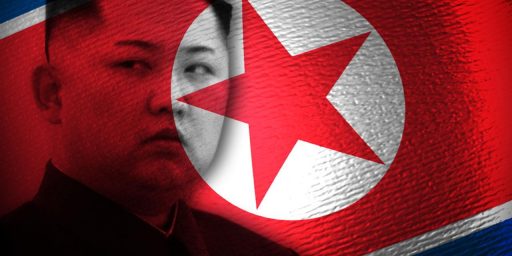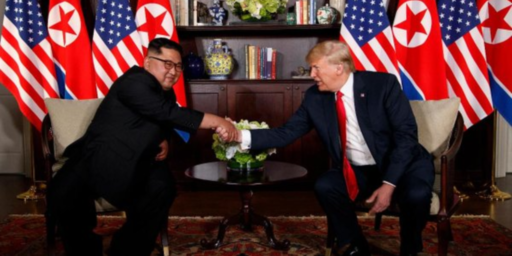The Kind of Thinking that Brought us the Iraq War
A preventative strike against North Korea is a bad idea.
Jeremi Suri, Professor of History and Public Affairs at my alma mater, the University of Texas, takes to the pages of the NYT with a very bad idea: Bomb North Korea, Before It’s Too Late.
Suri recommends:
The Korean crisis has now become a strategic threat to America’s core national interests. The best option is to destroy the North Korean missile on the ground before it is launched. The United States should use a precise airstrike to render the missile and its mobile launcher inoperable.
The logic here reminds me of pre-Iraq War logic: a bellicose dictator, who is often painted as unstable and unpredictable, appears to be developing weapons that, if deployed, could seriously damage regional stability and vital US national interests. Since an attack said dictator could have devastating results, best to act before such attacks take place. Indeed, a demonstration of power and resolve will help maintain, if not enhance, US security interests. Further: everything will go as planned once the action is undertaken.
A major flaw in Suri’s logic, I would argue: he is starting from the premise that Kim Jung Un’s threats are credible, i.e., that he would attack the South or US interests if allowed to continue. Yet, if the US were to militarily strike the North, then Kim would respond by backing down. Indeed, Suri’s argument is predicated on wishful (if not magical) thinking about how military power works. Just because the North is attacked does not mean that their automatic response will be better behavior. Indeed, provoking an adversary is a good way to get that adversary to overreact. Further, a US attack on the North would just confirm decades-worth of Kim family rhetoric about the outside, and could lead to demands from both leadership and the populace to retaliate. The Kims have been stoking nationalism as a means of controlling the population for decades—so how do we think an attack will play out in the minds of the masses?
At a minimum, I think that Suri’s position underestimates the degree to which Kim’s posturing, like that of his father before him, is aimed far more at a domestic audience than an international one. it is the same reason Saddam did not want to prove he didn’t have WMD: it would have weakened his domestic standing (as well as his international reputation).
One of the lessons that Iraq should have reminded us: military action rarely results in the best case scenario playing out. Moreover, as powerful as the US is, it cannot control outcomes. Or, to go the simplistic route : blowin’ stuff up is easy, controlling the aftermath is hard.
The facts here are relatively simple, even if the overall situation is complex:
1. We have a multi-decade track record of containment vis-a-vis the North in place.
2. Regardless of how “crazy” Kim appears, the leaders in the North are not suicidal. They know that if they spark a war, their regime is gone.
Ergo: if the goal is to avoid a new Korean War, which would have potentially profound implications for the region, perhaps it is best not to engage in activities that could start such a war (especially when history gives us a guide in regards to peninsula, not to mention recent examples of the way preventative military action plays out).
Update: I originally used the word “preemptive” in the description and the text, when the word “preventative” should have been used. A US attack on North Korean weapons would not be in the contexts of preempting a pending attack, but would, rather, be using military force to prevent an attack that might never be coming in the first place.




As should be needless to say, Steven, I agree with you. The only thing I can add is that Dr. Suri is urging us towards another preventive war. He’s not urging preemption but prevention.
Preventive war is almost always immoral. It would be more than a crime. As we should have learned by now it would be a mistake.
Just another one of our elites who thinks foreign policy problems can be solved with a couple of JDAMs.
@Dave Schuler: You are correct. I thought about my word choice, and meant to go back and revise it for the very reason that the terms have importantly different meanings.
When I read this the other day I at first thought the article was some sort of parody. I was also struck by the competing assumptions: 1) That Kim is nuts and could go off at any minute, and 2) That he would rationally back down if we blew up his facility.
Superpowers don’t go attacking every punk-ass bitch that talks big.
There is power in restraint.
Wise men know how to wield that power.
Sufi clearly doesn’t.
Cheney and his merry band of Neo-Cons didn’t have a clue.
Fools like McCain and Butters are no better.
Hopefully Obama does and can wield it effectively.
That said, there are times and places where a military “punch in the nose” is called for. This is not one of those times.
Does Suri not know that North Korea has thousands pieces of artillery aimed at Seoul?
Eisenhower on preemptive war:
“When people speak to you about a preventive war, you tell them to go and fight it.”
Of course, Eisenhower was a real life warrior, not an armchair cowboy. He is thus despised by conservatives…
He’s not despised by Conservatives….he’s despised by Republicans…huge difference.
I’m really surprised we haven’t seen an op-ed in a major newspaper with this argument:
@ C. Clavin
Yes, quite correct.
he is a professor one of the enlightened, someone that never joined the miltary someone who voted for obama, so he is not to be taken seriously, the military doesnt. Where were the rest of you when obama was attacking libya? that was a “just” war?
I was in the military and war is good, but always let the other guy hit first or do something to render a response. Attacking first is never a good idea except once the war already starts.
North korea is all talk, more of a threat to his neighbors, but unfortunately for the US, we are stuck in south korea, where we no longer belong.
The US real threat is on our southern borders, thats where our military belongs not playing peacekeeper in Asia, thats the only reason North korea is rattling his sword at us.
@jony101: “The US real threat is on our southern borders, thats where our military belongs not playing peacekeeper in Asia, thats the only reason North korea is rattling his sword at us.”
WTF???